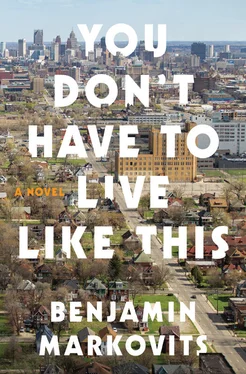Once I complimented him along these lines, and he said, “I don’t have much vanity left.”
“That doesn’t sound like a very happy condition.”
He made a funny sort of throwaway noise, the sound my father would make if you told him that a kid you knew in high school was pitching for a minor-league affiliate. Like, you don’t say. Not caring much about it.
Robert started paying me three hundred bucks a week to run a newsletter, which was mostly online and ran advertisements for neighborhood businesses: a dating service, a goods exchange, that kind of thing. Every Friday I printed out a heap of copies and stacked them at Joe’s and a few other places around town. There was a Your Stories section, in which I interviewed people and asked them why they moved to Detroit, and what they hoped their new life would be like, and so on. Robert wanted me to write a history of the whole business eventually, and this gave me an excuse to keep records and start nosing around. Each week I sat down with somebody new and it’s wonderful what people will tell you if you ask them.
There was a couple from Grand Rapids who planned to start a school, Bert and Ingrid Wendelman. Their relationship had an interesting backstory — it was Bert’s second marriage, and she was about fifteen years younger than him, one of these blond red-faced Dutch midwesterners, not particularly sexy, but healthy-looking, friendly and kind of ageless. I sometimes find it hard to tell how smart these northern European types are, since I usually measure intelligence by degrees of sarcasm, and Ingrid played everything straight. But I think she was a tough cookie, capable and not to be crossed.
Bert taught English and drama at a Catholic school in Forest Hills. Ingrid was the third grade homeroom teacher of his son, Jeremy, by his first marriage. This was how they got to know each other, and when Bert and his first wife decided on a divorce, they sat down with Jeremy very reasonably and asked him who he wanted to live with. He picked Bert and Ingrid — he really liked his homeroom teacher.
Of course, that’s not the whole story, and Bert also said that Jeremy’s mother was a resident oncologist who worked unpredictable hours, so he often gave the boy his supper and put him to bed. The divorce settlement made it difficult for him to keep the house and give his ex-wife a fair shake, so they sold it. Both Ingrid and he needed a new start — their affair had soured a lot of their daily relationships. People took sides and most people sided against them. One of the things they both realized, Bert said, meaning him and Ingrid, is how little it cost them to give up the friendships, both at work and among their neighbors, that they had built up over the years. He was determined this time around to arrange his life differently.
I liked Bert a lot. He was a good-looking guy, a little over six feet tall, with a mustache and a faintly thinning head of brown hair. Back at the school in Forest Hills he ran the kayaking club, and still tried to “get out on the water” at least once a weekend. He seemed in good shape. He was also about to turn forty-five, and you could just see a little stiffness in him when he walked, not stiffness exactly, but a kind of brittleness or carefulness, if he had to run a few steps, for example, or stand up from a low sofa.
The school he planned to set up with Ingrid was going to be a homestead-type school in a single house, with only a couple of classrooms. One for kids up to the age of eleven, which Ingrid was in charge of, and the other to see them all the way through high school. I asked him if he needed a history teacher.
“Have you done any teaching?” he said.
“I spent about five years lecturing on colonial America at the University of Aberystwyth.”
“Some of these kids will be twelve years old,” he said. “I tell you what. Why don’t you get a little experience, even if it’s only substitute experience, at some local school. If you can teach at a Detroit public high school you can teach anywhere.”
So I called Gloria. I wanted to call her anyway, but I used Bert’s idea about substitute teaching as an excuse, which I half regretted, because the way she sounded on the phone received a slight adjustment when my interest turned out to be practical. She remembered who I was.
“You ask a lot of questions,” she said. “And you get drunk like skinny people, kind of high energy. I thought you must have forgot my number.”
“I wrote it down.”
“Well,” she said, “you took your sweet time calling it.”
I told her I was thinking of becoming a teacher and eventually she invited me to lunch at her school — after the holidays. It was still mid-July, which gave me no excuse to see her for a couple of months. But we kept talking. For some reason neither one of us wanted to hang up, though I can’t say I enjoyed the conversation much. I didn’t want to say the wrong thing. When I met her the first time I was too drunk to care, but over the telephone I noticed a couple of times that I changed what I was saying because she’s black. For example, she asked me what my neighbors were like, if everybody was excited by what we were doing, if we all got along. I told her about going out one night with a few of them in the car to patrol the streets. Somebody took a gun, I said.
“You took a gun?”
“Mostly we just drove around talking. About two a.m. we went to one guy’s house and made some coffee and carried it back into the car. It was an intense way to get to know each other.”
“I bet,” she said.
It was a relief to get off the phone. Apart from anything else I wanted to look forward to seeing her again without anything getting in the way, like having to think of things to say. Gloria is a well-organized person and put a date in the diary for me to come by the school, a few weeks into September, but by that point Astrid and I were already sleeping together.
SUSIE WAS ONE OF THE reasons I went out more. By August she had started spending a lot of time at the house, and since Walter and I used to have dinner together every night, I tried to give them some space. This left a big hole in my life. Also, I was sexually lonely, and seeing Walter and Susie brought that home. For example, there were parts of my personality, like tenderness, that I didn’t get to use at all, and which I saw Walter and Susie using every day.
I ran into Astrid at Slows — a barbecue restaurant by the old train station, where I sometimes went to eat by myself at the bar. She was there with a couple of girlfriends, German girls from home who were visiting her, and they were going on to a party at one of those half-abandoned warehouses in east Detroit and invited me along. Artists had turned the building, which had all kinds of problems with it, including faulty electrics and asbestos plastering, into studios. The party was partly a chance to show off their work, but they’d also rigged up an elaborate sound system and themed different studio spaces according to types of drink and music. But the walls weren’t thick enough to separate the sounds, and the clash of noise fronts was really pretty powerful and unpleasant and hard to escape.
Astrid and I eventually took our drinks out into the parking lot. It was a hot August night, and I could hear the call of a Tigers doubleheader coming from one of the cars. There were several people, younger than me, sitting inside it, drinking and smoking pot. I could smell the sweet smoke drifting over towards us, towards the crumbly cinder block wall at the edge of the lot where Astrid and I sat down. She told me the story she hadn’t wanted to talk about before, which explained why Ernst had left her. I later saw another version of this story, which she had written down. It also appeared in a different form in a film she was working on, and after that night, after we started seeing each other, I heard her talk about it several times.
Читать дальше












